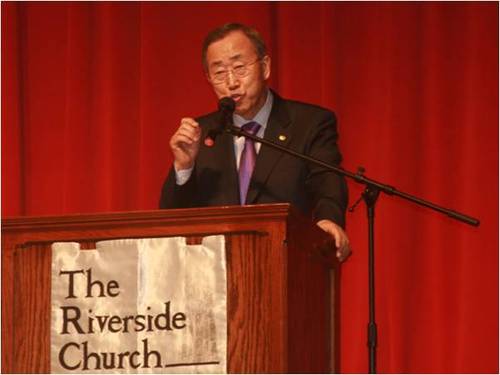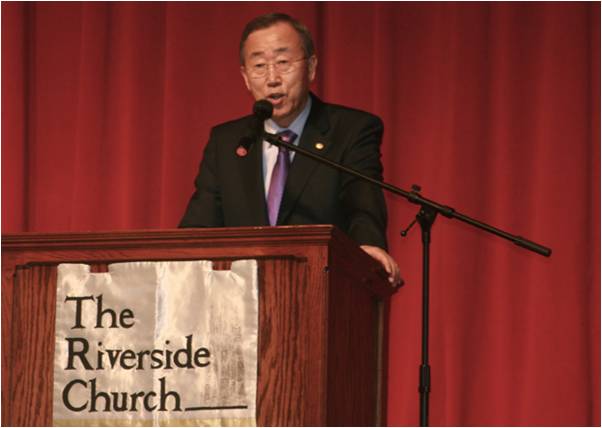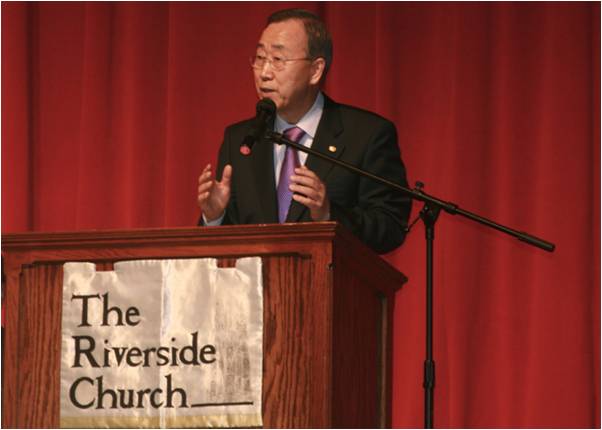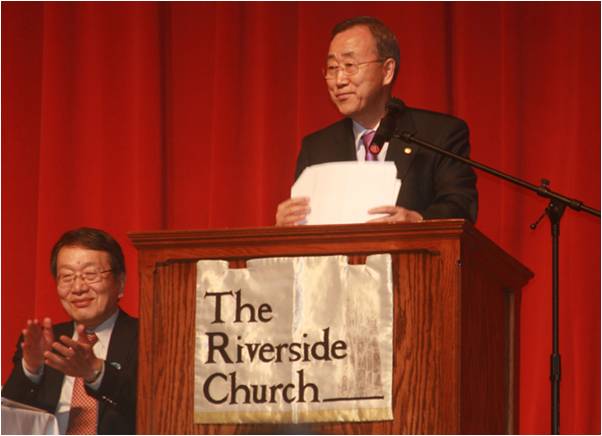In a Huffington Post exclusive, Peace Action organizers of the "Nuclear-Free, Peaceful, Just and Sustainable World" Conference at Riverside Church -- on the Upper West Side of Manhattan -- gave access to the ground breaking, hand-corrected speech of the United Nations Secretary General, the Hon. Ban Ki-moon, minutes after his speech was concluded on the eve of the Nuclear Non-Proliferation Treaty (NPT) Review Conference.
In his strong speech, the Secretary General shared his deeply felt passion and personal experiences with the international peace community packed into Riverside Church:
I know how much energy it takes to speak out, to protest, to carry the banner of this most noble human aspiration - world peace. Let me begin by saying how humbling it is to speak to you in this famous place, Riverside Church.
It was here that Martin Luther King, Jr. spoke against the Vietnam War, and Nelson Mandela spoke on his first visit to the United States after being freed from prison. Standing with you, looking at you, I can see what they saw: a sea of committed women and men who come from all corners of the world.
Our shared vision is within reach: a nuclear-free world.
On the eve of the Nuclear Non-Proliferation Treaty Review Conference beginning on Monday, we know the world is watching. Let us heed our call. Disarm now!
Ladies and gentlemen, from my first day in office, I have made nuclear disarmament a top priority. Perhaps, in part, this deep personal commitment comes from my experience as a boy in Korea growing up after the war. My school was rubble. There were no walls. We studied in the open air.
The United Nations rebuilt my country. I was lucky enough to receive a good education. But more than that, I learned about peace, solidarity, and above all, the power of community action. These values are not abstract principles to me. I owe my life to them. I try to embody them in all of my work.
Just a few weeks ago, I traveled to Ground Zero -- the former test site at Semipalatinsk, in Kazakhstan, where the Soviet Union detonated more than 450 nuclear explosions. It was strangely beautiful. The green steppe reached as far as the eye could see. But, of course, the eye could not immediately see the scope of the devastation. Vast areas where people still cannot go. Poisoned lakes and rivers. High rates of cancer and birth defects.
After Independence in 1991, Kazakhstan closed the site and banished nuclear weapons from its territory. Today, Semipalatinsk is a powerful symbol of hope. It is a new Ground Zero for disarmament, the birth-place of the Central Asian nuclear weapon-free zone.
The people of Hiroshima and Nagasaki -- and especially the hibakusha -- know too well the horror of nuclear war. It must never be repeated.
Yet 65 years later, the world still lives under a nuclear shadow. How long must we wait to rid ourselves of this threat? How long will we keep passing the problem to succeeding generations?
In August, I will travel to another Ground Zero - Mayor Akiba's proud city of Hiroshima. I will repeat our call for a nuclear-free world.
We here tonight know that it is time to end this senseless cycle. We know that nuclear disarmament is not a distant, unattainable dream. It is an urgent necessity, here and now. We are determined to achieve it. We have come close in the past.
Twenty-four years ago, in Reykjavik, Ronald Reagan and Mikhail Gorbachev came within a hair's breadth of agreeing to eliminate nuclear weapons. It was a dramatic reminder of how far we can go -- as long as we have the vision and the will.
Today's generation of nuclear negotiators must take a lesson from Reykjavik. Be bold. Think big. For it yields big results. And that is why, again, we need people like you. People who understand that the world is over-armed and that peace is under-funded. People who understand that the time for change is now.
Ladies and gentlemen, the Nuclear Non-Proliferation Treaty entered into force 40 years ago. Ever since, it has been the foundation of the non-proliferation regime and our efforts for nuclear disarmament. To quote you, Mr. (Joseph) Gerson, "It is one of the seminal agreements of the Twentieth Century."
Let's not forget. In 1963, experts predicted that there would be as many as 25 nuclear powers by the end of the last century. It did not happen, in large part because the NPT guided the world in the right direction. Today, we have reason for renewed optimism. Global public opinion is swinging our way. Governments are looking at the issue with fresh eyes.
Consider just the most recent events. Leading by example, the United States announced a review of its nuclear posture - forswearing the use of nuclear weapons against non-nuclear states, so long as they are in compliance with the Non-Proliferation Treaty.
In Prague, President Obama and President Medvedev signed a new START treaty, accompanied by serious cuts in arsenals. In Washington, the leaders of 47 nations united in their efforts to keep nuclear weapons and materials out of the hands of terrorists. And on Monday, we hope to open a new chapter in the life of the Nuclear Non-Proliferation Treaty.
In 2005, when leaders gathered for the last review of the NPT, the outcome did not match expectations. In plain English, it failed - utterly. We cannot afford to fail again. After all, there are more than 25,000 nuclear weapons in the world's arsenals. Nuclear terrorism remains a real and present danger.
There has been no progress in establishing a nuclear weapon-free zone in the Middle East. The nuclear programs of Iran and the DPRK are of serious concern to global efforts to curb nuclear proliferation.
To deal with these and other issues, I have set out my own five-point action plan, and I thank you for your encouraging response. I especially welcome your support for the idea of concluding a Nuclear Weapon Convention.
Article VI of the Nuclear Non-Proliferation Treaty requires the partners to pursue negotiations to a treaty on general and complete disarmament under international control. These negotiations are long overdue.
Next week I will call on all countries -- and most particularly the nuclear weapon states -- to fulfill this obligation. We should not have unrealistic expectations for the conference. But neither can we afford to lower our sights.
What I see on the horizon is a world free of nuclear weapons. What I see before me are the people who will make this happen. Please keep up your good work. Sound the alarm, keep up the pressure. Ask your leaders what they are doing, personally, to eliminate the nuclear menace.
Above all, continue to be the voice of conscience. We will rid the world of nuclear weapons. And when we do, it will be because of people like you. The world owes you its gratitude. Thank you.
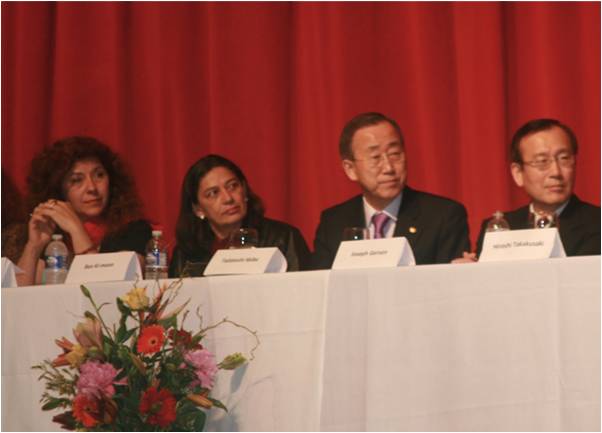
United Nations Secretary General Ban Ki-moon will move mountains this week at the United Nations in his quest towards ending nuclear proliferation. One man in the entire world has both the power and the platform to give peace a chance. That man is Ban Ki-moon.
Any errors in this hand-transcribed text are entirely my own and will be corrected as noted. Photos by the author.

